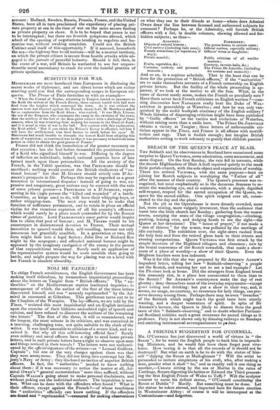NOLI ME TANGIER
To oblige French sensitiveness, the English Government has been making itself ridiculous, by tremendous inquisitorial proceedings
about the letters on Tangier from " British officers." The " au- thorities" on the Mediterranean station instituted inquiries ; in consequence of which, the author of the first of the three letters discovered himself, and was " severely reprimanded" by the Ad- miral in command at Gibraltar. This gentleman turns out to be the Chaplain of the Warspite. The lay-officers, we are told by the
Times, "resisted this most inquisitorial and un-English intrusion
upon the exercise of their hitherto undoubted right of speech and opinion, and have refused to discover the authors of the remaining two letters." The first of the three, it will be remembered, was
the longest, the most minute in its criticism, and was conceived in a taunting, challenging tone, not quite suitable to the cloth of the
writer. It was itself amenable to criticism of a severe kind, and re- ceived it. But why all this self-lowering official fuss ? Surely even military and naval officers have a right to send home private letters, and in such private letters have a right to observe upon men
and things noticed in their travels ? The letters were not authenti- cated by the official signature of the writers—as "Lemuel Gulliver,
Captain " ; but one of the very charges against them was that
they were anonymous. They did not bring into contempt her Ma- jesty's Navy or Army ; they disclosed no tactics of superior British
officers. In fact, the " authorities " needed to know nothing about them : if it was necessary to notice the matter at all, Ad- miral OwEst's " general memorandum" more than sufficed, without Captain WALLIS'S going about to make personal disclaimers, and without poking out the individual authors. The inquisition is use-
less. What What can be done with the offenders when found ? What is their offence, except against the French ?—of whose touchiness the " authorities " officially can know nothing. If the offenders ime,inund and " reprimanded"—eensured for making observations
Public criticism of all warlike matters ; Fruits, vegetables, &c. ; Gunnery, cannon-balls, &c.; Costume, cookery, and personal The Prince De Joinville, (including manners ; his costume and manners) :
And so on, in a copious schedule. That is the least that can be done for the protection of "British officers," if the "authorities" are to make themselves servants of a French censorship on English private letters. But the futility of the whole proceeding is ap- parent, if we look at the motive to all the fuss. What, in the name of decent manly sense, makes the French so peculiarly sore ? Have there never been French criticisms on English warfare ?—cun- ning discoveries how NAPOLEON really beat the Duke of WEL• LINGTON in generalship at Waterloo ; and how he was only van- quished by the stolid boobyish obstinacy of the English soldiery ? Whole libraries of disparaging criticism might have been published by "Gallic officers" on the tactics and evolutions of Waterloo, without raising more than a smile here. The Prince DE JOINVILLE obtains a victory at 'rangier; three letters of unfavourable cri- ticism appear in the Times, and France is all aflame with mortifi- cation and rage. That is foolish enough ; but imagine British authorities setting to work solemnly to gratify that childish passion !
on what they see to their friends at home—where does Admiral OwEtt draw the line between licensed and unlicensed subjects for comment ? Perhaps he, or the Admiralty, will furnish British officers with a list, in double columns, showing allowed and for- bidden subjects ; as thus—
ALLOWED: FORBIDDEN:
Objects of natural history; The genus homo, in certain cases; Civil natives (including rude ones); Official natives, especially military; Female attractions (or repulsions, if Officers' wives or daughters;
any); Private scandal;


























 Previous page
Previous page